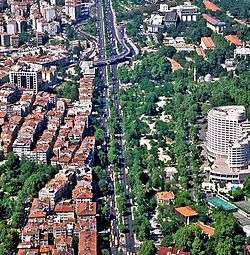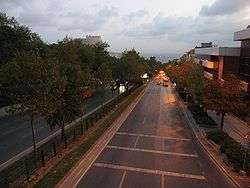Barbaros Boulevard
The Barbaros Boulevard (Turkish: Barbaros Bulvarı) is a 3.1 km (1.9 mi)-long major street in the Beşiktaş district on the European side of Istanbul, Turkey. It runs in a straight line in south-north direction from Beşiktaş Square over Yıldız up to Zincirlikuyu, where it passes over to Büyükdere Avenue. It is named after the Ottoman admiral of the fleet Hayreddin Barbarossa (Turkish: Barbaros Hayrettin Paşa) (c. 1478–1546), whose tomb is located in Beşiktaş.

The 1.5 km (0.93 mi) long boulevard ascends a slope from 1.5 m (4.9 ft) elevation at Beşiktaş Square up to 135 m (443 ft) at Balmumcu before Zincirlikuyu. This part of the street is 50 m (160 ft) wide with a slope gradient of 8%, while the part between Balmumcu and Zincirlikuyu has a width of 30 m (98 ft) and a slope gradient of 2–3%.
History
The construction of the boulevard began in 1957 within the urban redevelopment project for Istanbul by Italian city planner Luigi Piccinato initiated by Prime Minister Adnan Menderes (1899–1961).[1] Opened to traffic in 1958, the street was called initially Yıldız Yokuşu (Yıldız Slope) or Yıldız Yolu (Yıldız Road) since it passes through the Yıldız neighborhood.[2]
Its importance grew as it was connected to the 1973-built Bosphorus Bridge, which became the first direct route between the two sides on the Istanbul Strait. It serves as a feeder for the Bosphorus Bridge, which carries the inner-city motorway ![]()
References
- Hür, Ayşe (2012-11-04). "Menderes ve Erdoğan'ın Jakoben belediyeciliği". Radikal (in Turkish). Retrieved 2014-08-25.
- "barbaros Bulvarı" (PDF) (in Turkish). Beşiktaş Belediyesi. p. 23 of 96. Retrieved 2014-05-25.
